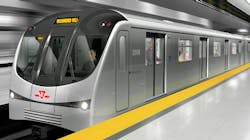Yonge North Subway Extension Business Case: Less stations, but within budget
Metrolinx published the Initial Business Case for the Yonge North Subway Extension (YNSE), one of the government of Ontario’s priority transit projects. The scope of the eight-kilometer (4.9-mile) extension shows a shift east in the alignment and a reduction of the originally planned five stations down to four stations, depending on budget.
Within the document, Metrolinx says it is “committed to delivering a YNSE that offers an optimized program within the available funding envelope” of C$5.6 billion (US$4.48 billion). The three options are estimated to carry total costs of C$4.3 billion to C$5.8 billion (US$3.44 billion to US$4.64 billion). However, Metrolinx explains none of the options can deliver the extension with five new stations within the project’s budget. Additional stations are estimated to cost between C$400 million (US$319.81 million) and C$500 million (US$399.79 million).
"We're so pleased to be taking this important step forward with the Yonge North Subway Extension and we're eager to get out there in the communities to share more details about how this important and much-needed project will benefit people," said Phil Verster, president and CEO of Metrolinx. "We know a fast, seamless subway connection between Richmond Hill and downtown Toronto has been envisioned for a long time, and we can't wait to make that vision a reality."
The Initial Business Case and supplementary analysis show how extending the Toronto Transit Commission Line 1 subway from Finch Station to Richmond Hill would improve regional mobility, help people travel faster and more reliably and support sustainable travel patterns and public health.
The Initial Business Case also recommends opening the Yonge North Subway Extension after the Ontario Line enters service as the Ontario Line is expected to provide relief to Line 1 and free up capacity for the Yonge North Subway Extension to proceed. The schedule included in the document estimates a contract could be awarded in September 2023 with construction starting in 2024 and the line entering service between 2029 and 2030.
Metrolinx will take the Initial Business Case to the public through virtual meetings and other engagement efforts shortly.
About the Author

Mischa Wanek-Libman
Group Editorial Director
Mischa Wanek-Libman is director of communications with Transdev North America. She has more than 20 years of experience working in the transportation industry covering construction projects, engineering challenges, transit and rail operations and best practices.
Wanek-Libman has held top editorial positions at freight rail and public transportation business-to-business publications including as editor-in-chief and editorial director of Mass Transit from 2018-2024. She has been recognized for editorial excellence through her individual work, as well as for collaborative content.
She is an active member of the American Public Transportation Association's Marketing and Communications Committee and served 14 years as a Board Observer on the National Railroad Construction and Maintenance Association (NRC) Board of Directors.
She is a graduate of Drake University in Des Moines, Iowa, where she earned a Bachelor of Arts degree in Journalism and Mass Communication.

